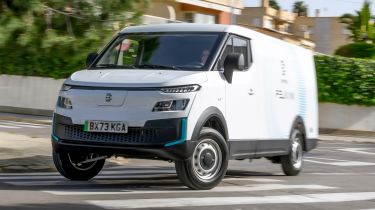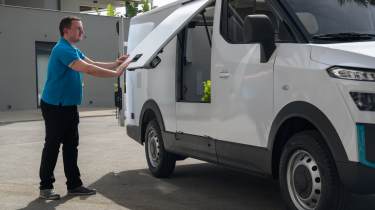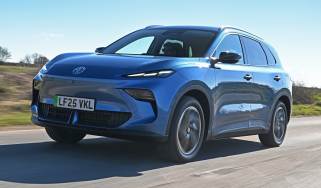B-ON Pelkan van review: plenty of space but very few creature comforts
B-ON’s first-ever van offers up to 174 miles of range, 7.1 cubic metres of cargo space and some useful additional services, but it’s not exactly a deluxe experience
Pros
- Loads of space
- Easy to drive
- Built to be cost friendly
Cons
- Dated interior
- Bouncy over bumps
- Looks a bit odd from some angles
| Battery size | Range | Wallbox charge time | Rapid charge time |
| 43.5kWh | 141 miles | 8hrs (0-100%, 7.4kW) | 35mins (30-80%, 60kW) |
| 53.6kWh | 174 miles | 10hrs (0-100%, 7.4kW) | 35mins (30-80%, 60kW) |
Just like electric cars, electric vans are steadily growing in popularity with businesses that are keen to lower their carbon footprint. As well as the usual suspects, such as the Stellantis Group brands and Renault, a number of new manufacturers are also emerging to try and take their share of this fledgling market. One such arrival is B-ON, which is making its road-going debut with the brand-new Pelkan.
You may have heard the name B-ON before, though, as the brand was originally formed in 2020 as a ‘mobility solutions provider’. In essence, it specialises in energy storage and fleet management for electric vehicles.
The brand already has some experience behind the scenes, but the Pelkan still needs to persuade potential customers into parting with their precious cash. It needs to impress on a grand scale, too, as the brand is aiming to sell the Pelkan in bulk to last-mile delivery fleets via its distribution partners. Individual, small-scale sales may happen in the future, but that all hinges on the van’s initial success.
There are two versions of the Pelkan to choose from, each with its own battery. The 43 is powered by a 43.5kWh pack, while the 54 features a larger 53.6kWh unit. These batteries have claimed maximum ranges of 141 miles and 174 miles, respectively.
The brand claims that both batteries can be rapid-charged from 30-80% in less than 35 minutes at a rate of 60kW. A full charge from a standard charger, meanwhile, will take around eight hours for the 43.5kWh battery and ten hours for the 53.6kWh pack.
This amount of range should prove adequate for van drivers who stick to shorter routes (the Pelkan’s target market), and it’s a similar story when it comes to power. Both variants are powered by a single motor producing 114bhp and 260Nm of torque. With a top speed of only 68mph, the B-ON is a bit strained at motorway speeds, but in town there’s a decent amount of shove when it’s needed. We found it took a good few moments for the right pedal to react when flooring it from a standstill.
The Pelkan is pretty easy to drive, with very light power steering and familiar controls such as a manual handbrake. There is a non-adjustable regenerative braking system but we barely felt this kicking in during testing. The middle pedal is still very much required. Things do get a bit more tricky when turning and reversing, as this van is a whopping 5,457mm long - a similar size to large panel vans like the Ford Transit. There are no rear windows but a reversing camera is included as standard.
Apart from the basic driving controls, there’s little else to be found within the Pelkan’s interior except lashings of dark scratchy plastics which are obviously designed to be hard-wearing rather than luxurious. It’s not completely bare, though, as sitting in the middle of the dashboard is a 10.1-inch touchscreen infotainment system with Android Auto and Apple CarPlay connectivity. Air-conditioning is also thrown-in as standard, but that’s about it.
The Pelkan’s lengthy body does look a bit stretched sitting on a 3,380mm wheelbase, but it has been designed this way in order to accommodate what is perhaps the most crucial element: its sheer carrying capacity. There’s 7.1 cubic metres of cargo space on offer, along with a maximum payload of 1,375kg in the 43 variant, dropping slightly to 1,290kg in the 54.
The distance between the rear axle and rear doors makes the van look a little odd but there’s a low loading lip at the back that allows easy access. B-ON is also hoping to improve access from the side by doing away with a traditional sliding door and instead opting for its ‘side shutter door’. This is essentially made up of two hydraulic hatches which open in opposite directions. It’s an interesting setup, but we still found the hatches to be quite heavy, and needed to stretch a bit in order to close the top one. It’s not necessarily worse than a sliding door, but we struggled to see any obvious benefit.
This is the only major ‘innovation’ to be found on the Pelkan, though, as the whole van has been built with budget in mind. As a result, everything has an overwhelming sense of simplicity and functionality. For example, the panels are made of damage-resistant aluminium, the only colours currently offered are white and silver, and there’s hard-wearing plastic trim everywhere. This is in order to keep longevity up and maintenance and repair costs down.
B-ON is aiming for a price of between £30,000 and £33,000 for the Pelkan. This would undercut plenty of the competition, and could give a much-needed advantage in this fiercely-fought market.
However, the Pelkan’s appeal will still largely depend on the perspective of the person who’s thinking about buying it. Its low-cost, no-frills design is a sensible approach for those who just want a functional and cost-effective tool for making deliveries. Look at it as a direct rival for the mainstream van options, though, and it suddenly looks sparsely equipped and rather outdated.






